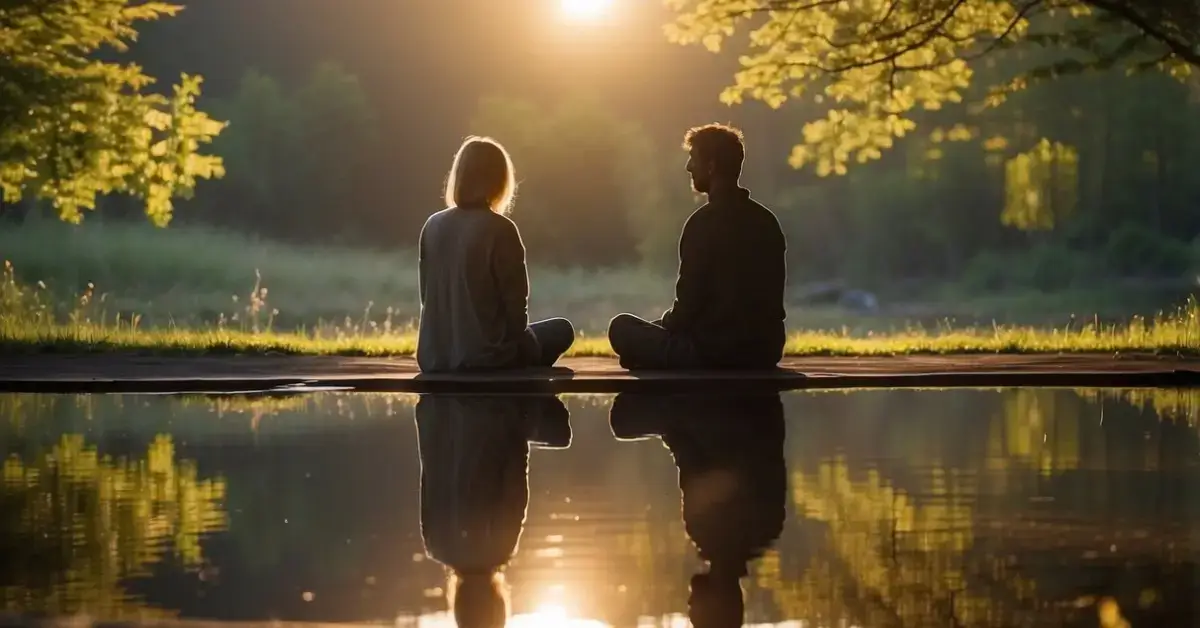How to start a spiritual journey: Ready to embark on a transformative path? Learn the essential steps on how to start a spiritual journey and discover the profound changes it can bring to your life.
How to Start a Spiritual Journey
Starting a spiritual journey can feel overwhelming, but taking it step by step makes it manageable and enjoyable. Here are some useful tips to get you started:
Declutter Your Space
Clearing physical clutter helps in clearing the mind too. I found that a tidy environment facilitated a peaceful mindset, which is essential for spiritual growth.
Set Intentions
Setting clear, positive intentions gives direction to the journey. I make it a point to write down my goals and revisit them frequently.
Self-Care Routine
A consistent self-care routine helps maintain emotional and mental balance. I ensure that I take time each day for activities like meditation or journaling.
Reflect Daily
Daily reflection on my progress is crucial. I usually spend a few minutes each evening to think about what I’ve learned and how I feel.
Be Open
Being open to new perspectives and experiences enriches the journey. I try different spiritual practices to see what resonates with me.
Take It Slow
Going at my own pace prevents feelings of overwhelm. I remind myself that I don’t need to understand everything immediately.
Affirmations
Using daily affirmations fosters a positive outlook. I remind myself that I am on a journey of self-discovery and growth.
Here is a simple table to summarize these steps:
| Step | Action |
|---|---|
| Declutter | Clear your physical space |
| Set Intentions | Define your spiritual goals |
| Self-Care Routine | Daily meditation, journaling |
| Reflect Daily | Evening reflections |
| Be Open | Try new spiritual practices |
| Take It Slow | Go at your own pace |
| Affirmations | Use positive affirmations daily |
Embarking on Your Spiritual Journey

Taking the first step on a spiritual journey can feel both exhilarating and overwhelming. Initially, it’s essential to understand the basics and set clear intentions to guide your path.
Understanding the Basics
A spiritual journey begins with an exploration of consciousness and awareness. At this stage, I focused on identifying my true nature and questioning the meaning of my existence. I sought resources that resonated with me, like books, podcasts, and online articles.
I also found it helpful to create a safe and quiet space for reflection. Whether it’s a corner of a room or a spot outdoors, having a dedicated area allowed me to meditate and practice mindfulness daily. Journaling became an integral practice, helping me keep track of my thoughts and experiences along the way.
Finding Your Intention and Setting Goals
Clarifying my intention and establishing clear goals provided a sense of direction. I started by asking myself, “Why am I embarking on this journey?” and “What do I hope to discover?” These questions helped me uncover my motivations and vision for spiritual awakening.
Setting realistic and achievable goals helped maintain my focus and motivation. For instance, I aimed to meditate for 10 minutes each day and read a chapter from a spiritual book weekly. Regular self-reflection ensured that my goals remained aligned with my evolving path, keeping me committed and engaged throughout the journey.
Embarking on this path required courage and the willingness to face both challenges and revelations. Each step brought me closer to understanding my individual existence and connecting with my higher consciousness.
Developing Spiritual Practices

Exploring various spiritual practices can enhance inner peace and connectedness. Embracing meditation, journaling, and fostering relationships with nature and community are essential steps.
Introducing Meditation and Mindfulness
Meditation and mindfulness are cornerstones of spiritual growth. I allocate a few minutes each day to sit quietly and focus on my breath. Practicing mindfulness helps me stay present and deeply connect with my inner self.
There are numerous meditation techniques to explore, such as guided meditation, breath awareness, and loving-kindness meditation. These practices cultivate mindfulness and foster a profound sense of inner peace. The key is to be consistent and patient, gradually expanding my comfort zone.
Benefits include reduced stress and enhanced emotional regulation. Regular meditation practice enriches my overall well-being.
Journaling and Creative Expression
Journaling is a powerful tool for self-discovery and creativity. By writing my thoughts and emotions, I gain clarity and insight into my spiritual journey. I set aside time each day to let my thoughts flow onto the page, allowing myself to explore freely without judgment.
Creative expression can extend beyond journaling to activities such as drawing, painting, or writing poetry. These outlets help channel my inner thoughts and emotions, fostering a deeper understanding of myself.
An essential aspect of this practice is giving myself permission to change and grow. This openness transforms my journaling into a dynamic process of self-discovery and personal development.
Connecting with Nature and Community
Spending time in nature revitalizes my spirit and connects me to the natural world. Walking in a forest or sitting by a river helps me feel grounded and present. Nature has a unique way of nurturing my soul and offering tranquility.
It’s also vital to build relationships within my community. Engaging with others who share similar spiritual interests fosters a sense of belonging and support. Community gatherings, spiritual workshops, and group meditations can be enriching experiences that deepen my spiritual practice.
By prioritizing these connections, I create a support network that enhances my spiritual journey, providing mutual encouragement and inspiration.
Overcoming Challenges and Finding Support

Starting a spiritual journey involves facing challenges and seeking support to navigate the path. Recognizing signs, seeking guidance from mentors, and embracing healing and therapy are key aspects of this journey.
Recognizing Signs and Synchronicities
On my spiritual journey, I often encounter signs and synchronicities that provide guidance. These signs can appear as repeating numbers, meaningful songs, or unexpected events.
By staying open and aware, I notice patterns that resonate with my inner self. These signs offer reassurance and help me make important decisions. For example, seeing repeated numbers like 111 or 444 can symbolize alignment and support from the universe.
Tracking these synchronicities in a journal helps me understand their significance. This practice builds my faith and hope, reinforcing my belief that I’m on the right path.
Seeking Guidance from Mentors and Elders
Connecting with mentors and elders has been instrumental in my journey. Their wisdom and experience provide invaluable support. I seek out individuals such as spiritual teachers, shamans, or community elders who offer both guidance and a sense of belonging.
Mentors help me navigate the complexities of my path, offering advice and sharing their experiences. Their presence offers hope and nurtures my faith in the process. I find it beneficial to join a community where I can connect with like-minded individuals.
Having a mentor means having someone to turn to during moments of doubt or when I face a “dark night of the soul.” They provide the love and support needed to persevere.
The Role of Healing and Therapy
Healing and therapy play a crucial role in my spiritual journey. Emotional and psychological challenges often arise, requiring professional aid. Therapy provides a safe space to explore deep-seated issues and traumas.
In addition to conventional therapy, alternative healing methods like Reiki, acupuncture, and energy healing contribute significantly. Each session helps me release negative energy and promotes emotional wellness. Engaging in regular therapeutic practices ensures continued personal growth and transformation.
I also find that healing involves forgiving myself and others, which fosters love and compassion within me. This holistic approach to healing supports me in overcoming the challenges I face on my spiritual journey.
FAQ – How To Start A Spiritual Journey
How do I know if I am spiritual?
You might be spiritual if you seek deeper meaning in life, feel connected to something greater, and practice mindfulness or meditation. A sense of inner peace, empathy, and a desire for self-improvement also indicate a spiritual inclination.
How do you open your third eye?
To open your third eye, practice meditation and mindfulness, focusing on the area between your eyebrows. Engage in visualization exercises, chant mantras, and maintain a clean, balanced diet. Be patient, as it requires consistent practice and inner work.
How to connect with spirituality?
Connect with spirituality by exploring meditation, prayer, and mindfulness. Read spiritual texts, spend time in nature, and engage in practices that resonate with your soul. Seek communities or mentors who share your spiritual interests and values.
If you liked this blog post about the topic: How To Start A Spiritual Journey, don’t forget to leave me a comment down below to tell me about your experience with it. Or have a look at my other articles:
- How to Pray When Under Spiritual Attack: A Friendly Guide
- How to Get Closer to God Spiritually: Simple Steps
- How Many Spiritual Gifts Are There: A Friendly Guide
- How to Be More Spiritual: Simple Daily Practices
Feel free to also check out our other Articles from the category “Spirituality“ and don’t forget to follow us on Pinterest.



